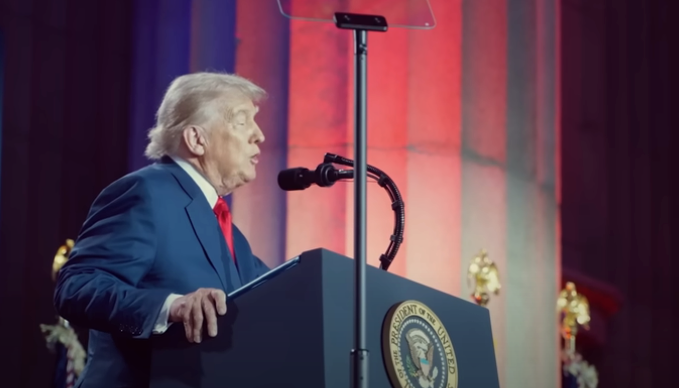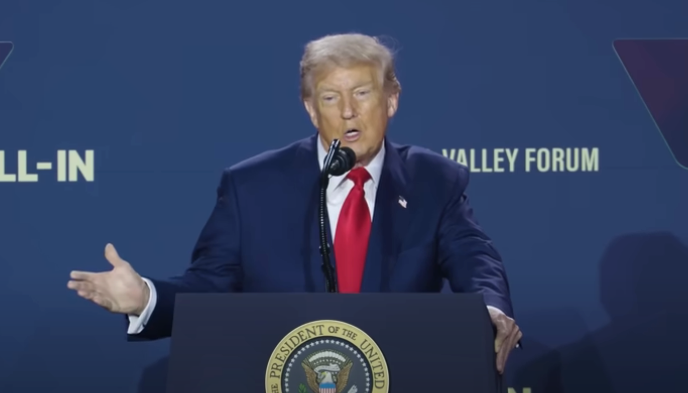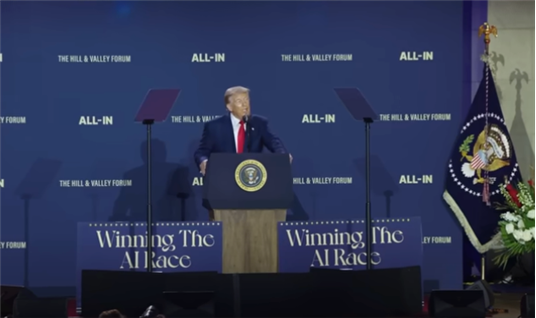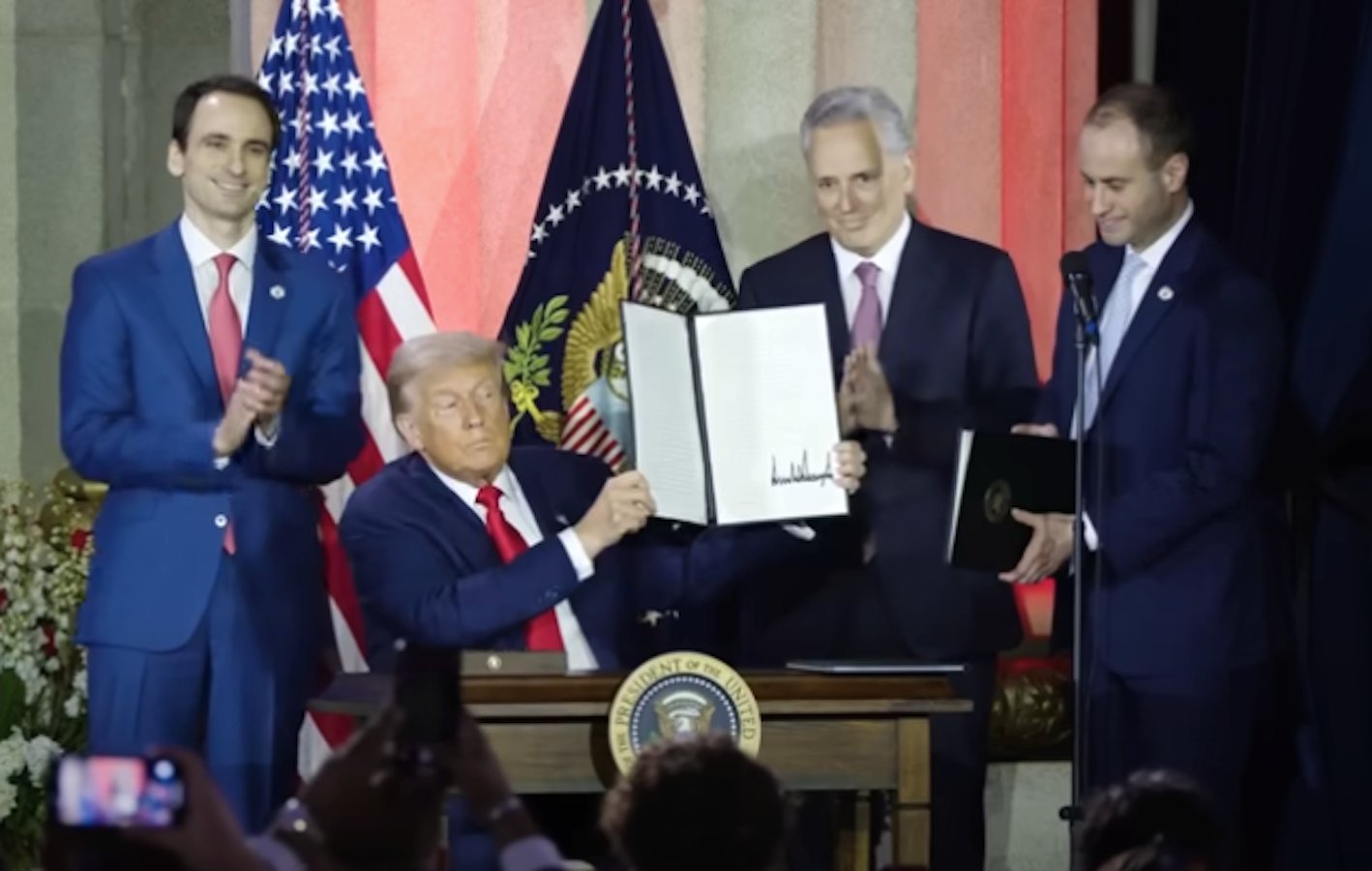Key Takeaways: Trump's AI Action Plan 2025
- $17 trillion in private AI investments have been committed since Trump's election, representing the largest technology investment in US history.
- Three executive orders signed July 23, 2025 establish fast-track permitting for data centers, expand AI exports to allies and ban federal procurement of AI systems with partisan bias.
- Federal regulations will override all state AI laws under Trump's plan to create a single national standard and eliminate the compliance burden of 50 different state requirements.
- Copyright reform allows AI training on copyrighted material without individual licensing agreements, adopting what Trump calls a "common sense" approach to compete with China.
President Donald Trump unveiled his administration's comprehensive strategy to win what he called the most important competition "since the dawn of the space age" — the global race for artificial intelligence dominance. Speaking to an audience of Silicon Valley's most prominent tech leaders, Trump signed three executive orders designed to fast-track AI infrastructure, promote American AI exports and eliminate what he termed "woke" ideology from government AI systems.
"From this day forward, it'll be a policy of the United States to do whatever it takes to lead the world in artificial intelligence," Trump declared during the White House AI summit. "Our children will not live on a planet controlled by the algorithms of adversaries advancing values and interests contrary to our own."

The president's remarks, delivered alongside the release of "Winning the AI Race: America's AI Action Plan," represent the most aggressive federal push for AI leadership in US history, outlining over 90 policy actions designed to ensure American technological supremacy.
‘America First’ in the AI Age
Trump's approach marks a dramatic shift from previous administration policies, emphasizing deregulation, rapid infrastructure development and what he calls "common sense" approaches to AI development. The president made clear that winning the AI race is a matter of national survival.
"Whether we like it or not, we're suddenly engaged in a fast-paced competition to build and define this groundbreaking technology that will determine so much about the future of civilization itself," Trump told the assembled tech executives, including NVIDIA CEO Jensen Huang, AMD's Lisa Su and representatives from major AI companies.
Related Article: Trump’s $92B AI and Energy Bet Sparks Confusion and Debate
Massive Infrastructure Investment and Energy Dominance
Trump announced that since his election, nearly $17 trillion in new investments have been committed to American AI development. Major tech companies including Meta, Amazon, Google and Microsoft are investing $320 billion or more in data centers and AI infrastructure this year alone, while NVIDIA has committed $500 billion over the next four years.
"You need more electricity than any human beings ever in the history of the world," Trump acknowledged, referencing AI's massive energy requirements. His administration plans to address this through what he calls "all-out American energy dominance," including nuclear, natural gas, oil and what he terms "clean, beautiful coal."
The first executive order Trump signed establishes fast-track federal permitting for AI infrastructure projects, including data centers, semiconductor manufacturing facilities and power plants. Companies will be allowed to build their own power generation facilities and sell excess energy back to the grid.
"America must once again be a country where innovators are rewarded with a green light, not strangled with red tape," Trump declared.
Federal Standards Override State Regulations
In a controversial move that challenges traditional federalism, Trump called for a single federal standard to govern AI development, overriding state AI regulations that he argues could handicap American competitiveness.
"You can't have one state holding you up. You can't have three or four states holding you up," Trump said. "If you are operating under 50 different sets of state laws, the most restrictive state of all will be the one that rules."
The president specifically criticized California's regulations, stating that individual states with "crazy governors" or restrictive policies could effectively shut down the entire industry by forcing companies to comply with the most stringent requirements.
Export Strategy and Alliance Building
Trump's second executive order aims to turn America into an "AI export powerhouse," reversing what he called the previous administration's restrictive approach. The president criticized the "Biden diffusion rule" that he says alienated American partners and drove allies toward Chinese technology.

"The last administration was obsessed with imposing restrictions on AI, including extreme restrictions on its exports," Trump said. "This alienated American partners and drove even our friends into the arms of China and other countries."
The new approach involves creating comprehensive AI export packages that include hardware, models, software, applications and standards for allied nations, while maintaining strict controls on adversaries like China.
War on ‘Woke AI’
"From now on, the US government will deal only with AI that pursues truth, fairness and strict impartiality."
- President Donald Trump
Perhaps the most politically charged aspect of Trump's plan involves eliminating what he calls "woke" ideology from AI systems. The third executive order bans federal procurement of AI technology that exhibits "partisan bias or ideological agendas such as critical race theory."
"The American people do not want woke Marxist lunacy in the AI models, and neither do other countries," Trump stated. "From now on, the US government will deal only with AI that pursues truth, fairness and strict impartiality."
This strategy represents a complete reversal of previous diversity, equity and inclusion requirements in federal AI procurement, with Trump arguing that such considerations hamper technological development and competitiveness.
Related Article: Without DEI, Can AI Still Be Fair?
Intellectual Property Reform
Trump addressed one of the industry's thorniest issues: the use of copyrighted material in AI training. He argued for a "common sense" approach that would allow AI systems to learn from copyrighted content without requiring individual licensing agreements.
"When a person reads a book or an article, you've gained great knowledge. That does not mean that you're violating copyright laws or have to make deals with every content provider," Trump explained. "China's not doing it. And if you're going to be beating China... you have to be able to play by the same set of rules."
Silicon Valley's Response and New Partnership
The president's remarks suggest a significant warming in relations with Silicon Valley, which he acknowledged had been strained during his first term. "I didn't like them so much the first term when I was running," Trump admitted. "But I've gotten to know them and like them, and I think they got to like me, but I think they got to like my policies maybe much more than me."
Trump called for a "new spirit of patriotism and national loyalty in Silicon Valley," criticizing tech companies that "pursued a radical globalism" while "building their factories in China, hiring workers in India and slashing profits in Ireland."
Global Competition and National Security
The president framed AI development as a zero-sum competition with national security implications. He emphasized that America currently leads China "very substantially" in AI capabilities but warned against complacency.
"Right now we're leading China very substantially in AI, very very substantially," Trump said. "But you have to be able to play by the same set of rules."
The administration's plan includes robust measures to prevent adversaries from accessing American AI technology while ensuring that US systems remain free from foreign influence or backdoors.
Workforce and Economic Impact
Despite concerns about AI displacing workers, Trump positioned the technology as fundamentally beneficial for American employment. The plan calls for massive job creation in infrastructure development, including roles for electricians, HVAC technicians, engineers and other skilled trades.
"This colossal investment in AI infrastructure... will also create thousands and thousands of great paying jobs, the kind of jobs we want, including lots of blue collar jobs," Trump promised.
Industry Leaders in Attendance
The summit brought together an unprecedented gathering of tech industry leaders, with Trump specifically recognizing NVIDIA's Jensen Huang, whose company has achieved what the president called a "100%" market share in critical AI chips.
"I said, 'Look, we'll break this guy up,'" Trump joked about initially considering antitrust action against NVIDIA. "I found out it's not easy in that business... it would take at least 10 years to catch him if he ran NVIDIA totally incompetently from now on."
International Implications
Trump's aggressive AI strategy has significant global implications, particularly for allies who must choose between American and Chinese technology ecosystems. The president emphasized that countries worldwide are eager to do business with American tech firms.
"When I traveled to the Middle East in May, every leader I met was thrilled to do business with American tech firms and with America," Trump reported, adding that foreign leaders told him America had transformed from a "dead country" to "the hottest country anywhere in the world" within a year.
Related Article: Why AI Data Centers Are Turning to Nuclear Power
Implementation and Timeline
The administration promises rapid implementation of its AI strategy, with Trump directing agencies to move with unprecedented speed. The plan is a major shift toward prioritizing rapid development and deployment over cautious regulation.

"We are Americans and we are Americans first," Trump declared. "We do not shrink from the future or cower in the face of uncertainty. We dominate the future."
Looking Ahead
"What we really need to be successful is a very simple phrase called common sense."
- President Donald Trump
Trump's AI strategy sets the stage for what could be a groundbreaking period in American technological leadership. Emphasizing rapid innovation, massive infrastructure investment and aggressive competition with rivals, the administration is betting that American ingenuity and capital can maintain global AI supremacy.
"This is really something that nobody expected. It just popped out of the air and here we are," Trump reflected on AI's rapid emergence. "But we.. what we really need to be successful is a very simple phrase called common sense."
The success of this ambitious strategy will depend on the administration's ability to execute its vision while navigating complex technological, regulatory and geopolitical challenges in what Trump calls "the most important technological revolution in the history of the world."
As the global AI race intensifies, Trump's declaration that America will "dominate the future" represents a high-stakes gamble on American technological superiority that could reshape not only the AI industry but the global balance of power for decades to come.
Find the full AI action plan here.
